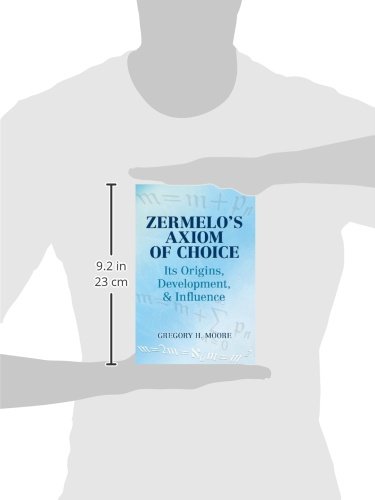



Zermelo's Axiom of Choice: Its Origins, Development, and Influence (Dover Books on Mathematics)
A**N
A truly thrilling history of the axiom of choice
When I received this book in the mail, and started turning over the pages, I was literally so thrilled by what I read that I had to put it down and rest for a while.Over the last couple of years, I have collected some 45 books on set theory and mathematical logic, trying to understand the significance of the axiom of choice. With this book, Zermelo's Axiom of Choice: Its Origins, Development, and Influence , by Gregory H. Moore, many of my questions about the axiom of choice were answered within a few minutes of turning the pages.This book is a very well researched history of a wide range of set theory axiomatization issues centred around the axiom of choice as the core theme. The references are extensive and useful. The style is friendly and clear. But most importantly, the content is very substantial and does not avoid technicalities when they are required. (Some authors of mathematics history make their books almost useless by avoiding mathematics as much as possible, which is a bit pointless really.)Some topics in this book which especially took my interest were discussion of the mediate cardinals of Whitehead and Russell ( Principia Mathematica - Volume Two ), Borel's assertion of the metaphysicality of the axiom of countable choice (page 103), the varying reactions of mathematicians in different countries to different versions of the axiom of choice, the development of model theory to settle questions, the multiple definitions of a finite set, and the constructible and von Neumann universes.Moore mentions, by the way, that the von Neumann universe was actually due to Zermelo. I checked the 1920s literature and verified that in fact von Neumann's papers did not mention the cumulative type hierarchy which we now call the von Neumann universe, but Zermelo did present this universe in a 1930 paper. All the way through this book, there are insights into the historical context and development of set theory, proof theory and mathematics generally.At the end of the book, there are 6 full-page box-and-arrow-diagrams summarizing the relations between the axioms and theorems of set theory. These are a useful atlas to navigate the perplexing multiple versions of axioms and their consequences.Although most mathematicians have nowadays acquiesced into a sometimes uncomfortable acceptance of the axiom of choice, it is important to know that this acquiescence was not seen as inevitable in the first half of the 20th century. Halmos wrote the following in 1960, in his Naive Set Theory , page 60."It used to be considered important to examine, for each consequence of the axiomof choice, the extent to which the axiom is needed in the proof of theconsequence. An alternative proof without the axiom of choice spelled victory; aconverse proof, showing that the consequence is equivalent to the axiom ofchoice (in the presence of the remaining axioms of set theory) meant honorabledefeat. Anything in between was considered exasperating."Moore's book explains the whole rich and suspense-filled background behind Halmos' brief comment.
S**N
Great text, problem with the state of printing
As the other reviews clearly state, the book itself is a beautiful reconstruction of the status of mathematics before and after Zermelo's presentation of the Axiom of Choice. Moore manages to fit the very broad topic into a very interesting narrative, while he still gives the pointers to the concrete mathematical theorems involved. So the text itself deserves 5 stars easily.However, I am not completely convinced by this print. I already got several books published by Dover, and even though sometimes linesare compressed/not scanned exactly or single characters are not printed correctly, the printing is adequate. This is true for most of this book, too. But... page 144 is not scanned as a whole. At the left margin, the several characters per line are missing, rendering most of this page very hard to grasp.All in all, the book is still great to read (with this one exception), and is definitely worth its money, as long as you are a) interested in the history of modern mathematics and b) willing to read many theorems without proofs (most of the time). I suspect that b) should not be a problem for the intended target audience, since many of the theorems are well-known.
R**B
good book GREAT topic
Great Book!!! Love this book. Read it three times.
I**R
An Essential Part of Recent Mathematical History
This is the kind of book about Mathematical History I love to read. It follows the development of an important idea through various phases showing why mathematicians of particular persuasions thought and wrote of it as they did. This does a lot more for one's understanding than a mere series of definitions, statements and proofs. Of course, it is harder than reading a mere text book. To get much out of it the reader has to take his/her own position on some difficult issues. But the journey is well worth the effort.
K**R
A history of mathematical discomfort
The math is somewhat heavy sledding, but the narrative of mathematicians grudgingly accepting AC (or, in some cases, loudly rejecting it while unconsciously using it) is fascinating.
J**Z
Five Stars
Clear and concise.
M**N
Five Stars
Great
M**.
Una monografia eccellente
Si tratta de IL libro sull'assioma di scelta. Completo, esauriente, vastissimo. Moore raccoglie centinaia di episodi, aneddoti, riferimenti in una monografia definitiva sull'argomento.La prospettiva storica aiuta molto anche un non addetto ai lavori a prendere consapevolezza delle problematiche in gioco, a comprendere il ruolo dell'assioma nella matematica odierna, ma sopratutto a comprenderne le radici e la ragioni.Degna di nota anche l'ampia bibliografia da cui Moore attinge puntualmente, rendendo il testo anche un'ottima referenza per approfondimenti sul tema.
Trustpilot
1 week ago
5 days ago